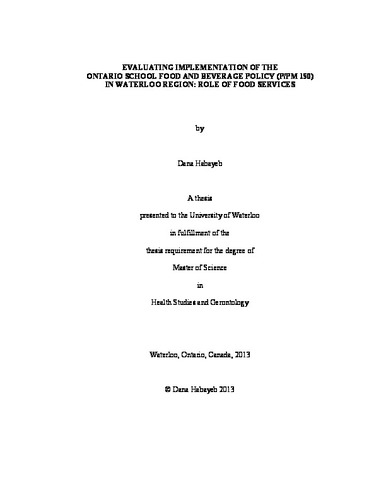| dc.contributor.author | Habayeb, Dana | |
| dc.date.accessioned | 2013-10-10 20:43:16 (GMT) | |
| dc.date.available | 2013-10-10 20:43:16 (GMT) | |
| dc.date.issued | 2013-10-10T20:43:16Z | |
| dc.date.submitted | 2013-09-26 | |
| dc.identifier.uri | http://hdl.handle.net/10012/7999 | |
| dc.description.abstract | Objectives. The purpose of this study was to assess food service organizations’ experiences with the implementation of P/PM 150, perceived strengths and weaknesses of food services organizations implementing P/PM150, and perceived opportunities and threats to the policy’s implementation.
Methods. Semi-structured interviews were done with food service organizations selling food to Waterloo Region schools. Food services identified perceptions of and experiences with P/PM 150. Interview responses were coded using ‘open coding’, coding was based on the SWOT analysis, a reliability test was conducted, and matrix coding was used to compare food services’ attributes to their experiences implementing P/PM 150.
Results. Food services that had a good experience mentioned more ‘opportunities’ resulting from the policy and more ‘strengths’ within their company. Both food services that had a negative or positive experience mentioned an equal number of ‘threats’. However, food services that had negative experiences mentioned more ‘weaknesses’ than those that had positive experiences. More small food services, and food services that serve elementary schools identified having a good experience with the policy. All food services that identified themselves as healthy before implementing the policy had a positive experience with the policy. The main factor that determined whether food services had a negative experience implementing the policy was if the food service had to make many changes to their menu to comply with P/PM 150.
Conclusions. Collecting additional data on the compliance of food services, the role of education in policy acceptance, and schools’, parents’, and students’ experiences with the policy would be beneficial to get a full understanding of the policy’s impact. | en |
| dc.language.iso | en | en |
| dc.publisher | University of Waterloo | en |
| dc.subject | P/PM 150 | en |
| dc.subject | Policy | en |
| dc.subject | Evaluation | en |
| dc.subject | Nutrition | en |
| dc.subject | Obesity | en |
| dc.subject | SWOT | en |
| dc.subject | Food Services | en |
| dc.subject | Youth | en |
| dc.title | Evaluating Implementation Of The Ontario School Food And Beverage Policy (P/Pm 150) In Waterloo Region: Role Of Food Services | en |
| dc.type | Master Thesis | en |
| dc.pending | false | en |
| dc.subject.program | Health Studies and Gerontology | en |
| uws-etd.degree.department | Health Studies and Gerontology | en |
| uws-etd.degree | Master of Science | en |
| uws.typeOfResource | Text | en |
| uws.peerReviewStatus | Unreviewed | en |
| uws.scholarLevel | Graduate | en |

